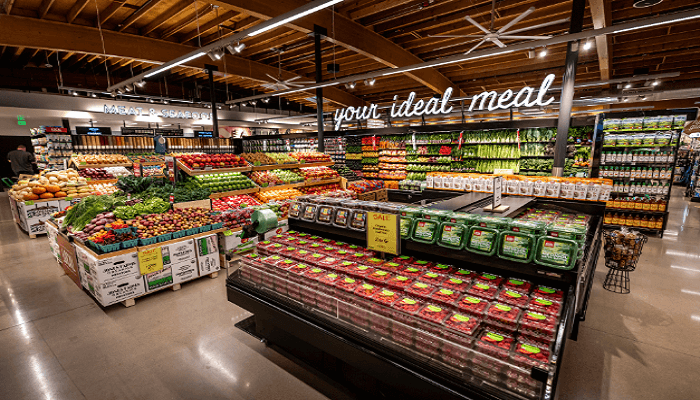Why is Whole Foods So Expensive – If you’ve ever shopped at Whole Foods, you know that it’s not exactly cheap. In fact, it’s often referred to as “Whole Paycheck” due to its reputation for high prices.
But why are Whole Foods so expensive? Is it just a matter of the store marking up their products for no reason, or is there something more to it? In this article, we’ll take a deep dive into the world of Whole Foods prices and explore nine reasons why Whole Foods is so expensive.
Reasons Why is Whole Foods So Expensive

Whole Foods is a well-known grocery store that has gained a reputation for offering high-quality, organic, and healthy food options.
One thing that stands out about Whole Foods is its high prices.
Many consumers have wondered why Whole Foods is so expensive, especially when compared to other grocery stores.
While some may attribute the high prices to simple markups, the reality is that there are many factors that contribute to the cost of Whole Foods products.
From the quality of ingredients to the specialized products and limited supply, there are several reasons why Whole Foods is more expensive than other grocery stores.
By understanding the reasons behind the higher prices at Whole Foods, consumers can make informed decisions about where to shop and what products to buy.
1. High-Quality Products

One of the main reasons why Whole Foods is so expensive is because they focus on selling high-quality products.
Whole Foods is committed to providing organic, non-GMO, and locally sourced products whenever possible.
These products are often more expensive to produce and require more resources, which is reflected in the higher price tag.
Additionally, Whole Foods products are often free of artificial preservatives, colors, and flavors, which can increase production costs.
2. Cost of Production
Another reason why Whole Foods is so expensive is that the cost of production for many of its products is higher than conventional products.
For example, organic farming methods often require more labor and resources than conventional farming, which increases the cost of production.
Additionally, many of the products sold at Whole Foods are made with higher-quality ingredients, which are more expensive to source.
3. Limited Supply
Many of the products sold at Whole Foods are produced in limited quantities. This can be due to a variety of factors, including the seasonality of certain products and the fact that many of the products are sourced from small, local producers.
Limited supply can drive up the price of products, as producers may need to charge more to cover their costs.
4. Specialty Products

Whole Foods specializes in selling products that are difficult to find elsewhere. This includes a wide variety of specialty items such as gluten-free, vegan, and paleo products.
These products are often more expensive to produce due to the specialized ingredients required.
Additionally, the smaller market for these products can drive up the price, as producers may need to charge more to cover their costs.
5. Store Environment
The store environment at Whole Foods is often cited as a reason for the higher prices. Whole Foods stores are designed to create a specific atmosphere that promotes healthy living and high-quality products.
This includes features such as a large selection of fresh produce, prepared foods, and natural health products.
The cost of maintaining this type of environment can be high, and this is reflected in the prices of products.
6. Labor Costs
Whole Foods is committed to fair labor practices and pays its employees a living wage. This can contribute to the higher prices of products, as labor costs are a significant part of the production process.
Whole Foods employees are often highly trained and knowledgeable about the products they sell, which can increase labor costs.
7. Transportation Costs
Many of the products sold at Whole Foods are sourced from small, local producers. While this can be a positive aspect of the store, it can also drive up the price of products.
Shipping costs for small producers can be high, especially if they are located far away from the store.
These transportation costs are often passed on to the consumer, resulting in higher prices.
8. Brand Reputation

Whole Foods has built a reputation as a store that sells high-quality, healthy products. This reputation can drive up the price of products, as consumers are willing to pay more for items that they perceive as being better for them.
9. Profit Margin
Like any other business, Whole Foods needs to make a profit to stay afloat. In order to do this, they need to set prices that will cover their costs and provide a profit margin.
While some people may argue that Whole Foods’ prices are excessively high, the reality is that the company needs to make a profit to stay in business and continue to provide high-quality products.
FAQs:
If you’re someone who is health-conscious and enjoys buying organic and natural foods, then you’ve likely heard of Whole Foods.
While this popular grocery store is known for offering high-quality products that promote healthy living, it’s also known for having some of the highest prices in the industry.
This has led many people to question why Whole Foods is so expensive.
Are Whole Foods overpriced?
Whole Foods is generally more expensive than other grocery stores, which can make it seem overpriced to some consumers.
However, it’s important to note that Whole Foods offers a wide variety of high-quality, organic, and natural products that are often more expensive to produce.
The company is committed to fair labor practices and sustainable sourcing, which can also contribute to higher prices.
Are Whole Foods for rich people?
While Whole Foods’ higher prices may make it seem like a store only for the wealthy, the reality is that people of all income levels shop at Whole Foods.
While some products may be more expensive, the store offers a range of products at various price points, making it accessible to people from all walks of life.
Are Whole Foods actually healthier?
Whole Foods offers a wide variety of healthy options, including organic produce, grass-fed meats, and natural health products.
However, it’s important to note that not all products at Whole Foods are healthy, and some may still contain added sugars, preservatives, and other ingredients that are not considered healthy.
What are the cons of Whole Foods?
One of the biggest cons of Whole Foods is its higher prices, which can make it less accessible to some consumers.
Some people may find the store overwhelming or intimidating, as it can be quite large and offer a wide variety of products.
Finally, not all products at Whole Foods are healthy, and some may still contain added sugars, preservatives, and other ingredients that are not considered healthy.
How to shop cheaper at Whole Foods?
To shop cheaper at Whole Foods, consider buying in bulk, taking advantage of sales and promotions, and shopping for seasonal produce.
Additionally, consider purchasing the 365 brand, which is Whole Foods’ private label brand that offers a range of products at a lower price point.
Are Whole Foods cheaper than Costco?
Overall, Costco tends to be cheaper than Whole Foods. While both stores offer high-quality products, Costco is able to offer lower prices due to its bulk purchasing and streamlined operations.
However, it’s important to note that the two stores offer different products, with Whole Foods focusing more on organic and natural products.
What is the difference between Trader Joe’s and Whole Foods?
While both Trader Joe’s and Whole Foods offer high-quality, healthy products, there are some key differences between the two stores.
Trader Joe’s tends to be less expensive than Whole Foods and offers a more limited selection of products.
Additionally, Trader Joe’s offers a range of unique and interesting products, while Whole Foods focuses more on organic and natural products.
Finally, Trader Joe’s has a reputation for being more budget-friendly and accessible to people of all income levels, while Whole Foods is often seen as a store for more affluent shoppers.
Conclusion: Why is Whole Foods So Expensive
In conclusion, there are many reasons why Whole Foods is so expensive. From the high-quality products to the specialized items, limited supply, and fair labor practices, there are many factors that contribute to the higher prices.
While some people may argue that the prices are too high, it’s important to understand that Whole Foods is committed to providing high-quality, healthy products that are often more expensive to produce.
At the end of the day, it’s up to each individual consumer to decide if the benefits of shopping at Whole Foods outweigh the higher prices.
In the end, it’s clear that Whole Foods has built a reputation as a store that sells high-quality, healthy products.
While their prices may be higher than some other stores, they are committed to providing a wide variety of products that are difficult to find elsewhere.
Whether you’re looking for organic produce, specialty items, or natural health products, Whole Foods has something for everyone.
So, the next time you find yourself shopping at Whole Foods, remember that you’re not just paying for a product – you’re paying for a commitment to quality and a healthier lifestyle.